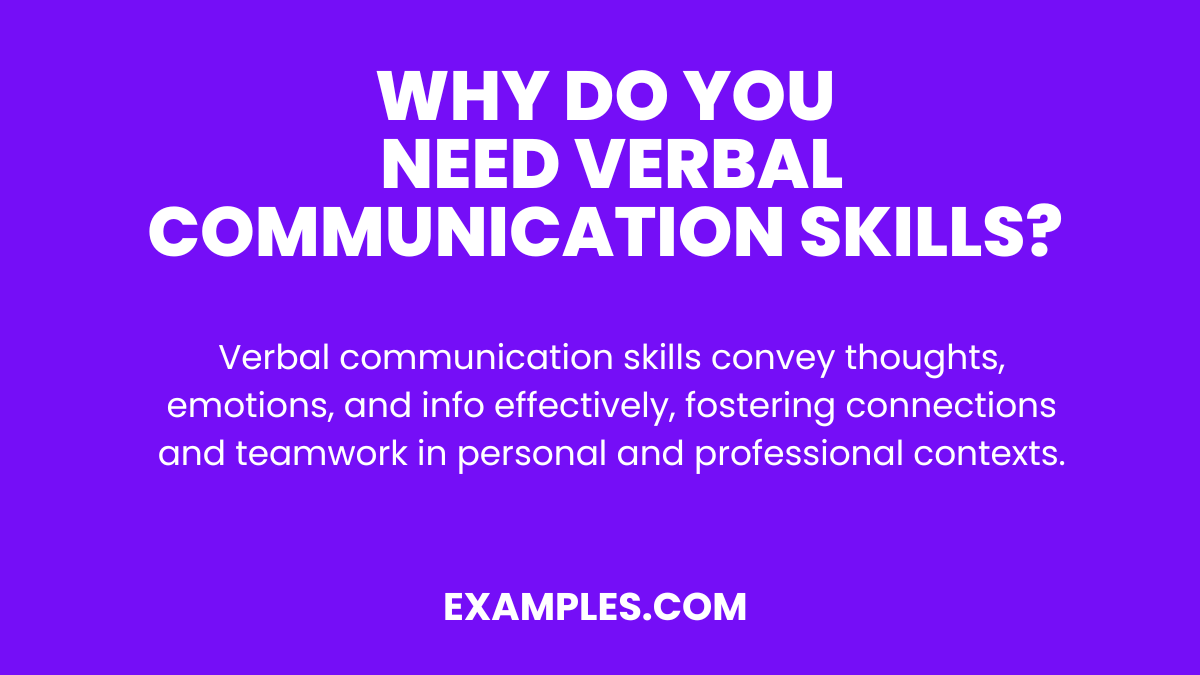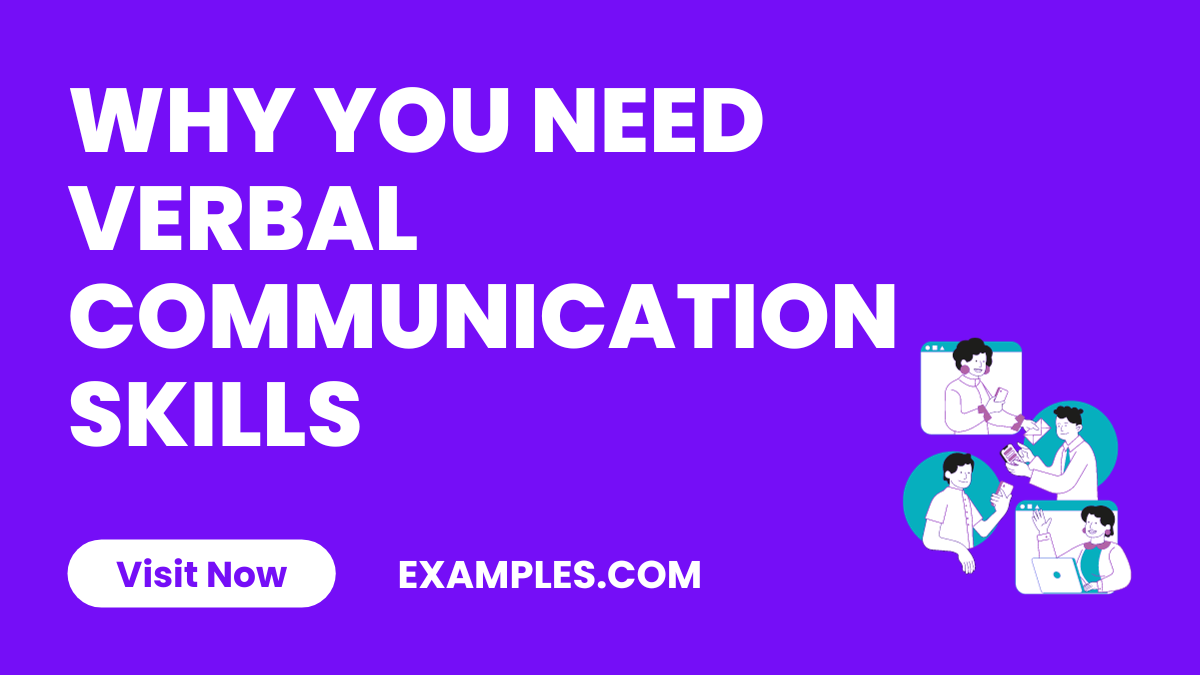Why You Need Verbal Communication Skills?
Embarking on the journey of enhancing your verbal communication skills is pivotal in navigating both personal and professional landscapes. This guide illuminates the path by providing Communication Examples and practical scenarios where adept verbal skills transform interactions and outcomes. Discover the power of words, learn from real-life communication examples, and grasp the nuanced art of conveying ideas effectively.
Download Importance of Verbal Communication in Daily Life PDF
Why Do You Need Verbal Communication Skills? – Meaning

Verbal communication skills are essential as they enable individuals to convey thoughts, feelings, and information clearly and effectively. It’s about more than just talking; it’s about ensuring your message is understood and received as intended. These skills help in building relationships, facilitating understanding, and fostering effective teamwork. Whether in personal conversations or professional settings, Verbal Communication Examples are key to expressing oneself clearly and making meaningful connections.
Why Do Individuals Require Verbal Communication Skills in the Workplace?
In the bustling dynamics of the workplace, verbal communication skills are the linchpin of efficiency, collaboration, and leadership. Effective communication ensures that ideas are shared, issues are resolved swiftly, and team harmony is maintained, leading to a productive and positive work environment. In today’s fast-paced work environments, effective Verbal Communication in the Workplace is crucial. It aids in clear information dissemination, problem-solving, and fostering professional relationships.
- Understand the Functions of Verbal Communication: Recognize the different purposes communication serves – from instructing and persuading to comforting and problem-solving.
- Learn and Apply Verbal Communication Techniques: Master techniques such as active listening, clear articulation, and appropriate tone to improve your verbal interactions.
- Acknowledge the Communication: Advantages and Disadvantages of Verbal Communication be aware of the immediate feedback loop in verbal communication, while also understanding potential misunderstandings due to lack of non-verbal cues.
- Regularly Engage in Communication: Types of Verbal Communication is practice various forms, from one-on-one conversations to group discussions and formal presentations.
- Commit to Continuous Improvement: Seek feedback on your communication skills and engage inWays to Improve Verbal Communication Skills through training and practice.
What Are the Key Reasons for Emphasizing Why You Need Verbal Communication Skills?
Mastering verbal communication is not just about speaking well; it’s about ensuring that your message catalyzes understanding, action, and reaction. It’s a skill that amplifies your influence, facilitates learning and teaching, and opens doors to numerous opportunities. Effective verbal communication skills are fundamental in all facets of life. They empower individuals to express themselves clearly, negotiate successfully, and build stronger relationships.
- Percentage Impact: Understand What Percent of Communication is Verbal and how a significant portion of human interaction relies on spoken words.
- Techniques for Clarity and Impact: Use Verbal Communication Techniques to ensure your message is clear and has the intended impact on your audience.
- Navigating the Advantages and Challenges: Leverage the benefits while understanding and mitigating the drawbacks inherent in verbal exchanges.
- Versatility in Functions: Appreciate the various Functions of Verbal Communication, from expressing emotion to instructing, that are essential in both personal and professional realms.
- Sector-Specific Relevance: Recognize the importance of tailored verbal communication in diverse fields like Verbal Communication in Healthcare, Verbal Communication in Business, and education, adapting your style and content to fit the audience and setting.
How Good Verbal Communication Skills Can Impact Your Life
Mastering verbal communication is transformative, touching every aspect of life, from enhancing student learning to improving law enforcement interactions. Let’s explore the steps to enrich these areas, including aiding those with autism and optimizing school environments.
1. Enhancing Learning- Verbal Communication for Students thrive academically and socially when Verbal Communication for Teachers develop strong verbal skills. Clear communication fosters better understanding, collaboration, and confidence, leading to a more enriched educational journey.
2. Effective Operations – Verbal Communication in Law Enforcement, clarity and precision in communication are vital. Effective Verbal Skills in Children reduce misunderstandings, improve community relations, and enhance the safety and efficacy of operations.
3. Inclusive Communication – Verbal Communication for Autism Tailoring Communication Strategies to assist individuals with autism can significantly improve their ability to express needs and understand others, fostering a more inclusive society.
4. School Environment – Verbal Communication for School thrives when educators and students communicate effectively. Promoting verbal skills within the school setting ensures a supportive, engaging, and collaborative learning environment.
5. Continuous Improvement- How to Improve Verbal Communication is a lifelong journey. Regular practice, feedback, and adaptation of new techniques are crucial for continual enhancement of these essential skills.
How Can Verbal Communication Skills Enhance Your Personal Relationships?
Effective verbal communication fosters understanding and trust, strengthening bonds and resolving conflicts, highlighting the Importance of Verbal Communication in personal relationships.
Why Should Students Be Taught Why They Need Verbal Communication Skills?
Students with robust verbal skills excel academically and socially, adhering to the Rules of Verbal Communication for success in diverse settings.
What Advantages Come From Understanding Why You Need Verbal Communication Skills?
Recognizing the need for verbal skills improves clarity and efficiency in interactions, bridging the gap between Verbal vs Written Communication and Verbal vs Oral Communication.
In conclusion, mastering verbal communication skills is pivotal for personal growth, professional success, and effective relationships. By understanding its importance, acknowledging the signs of poor communication, and adopting strategies for improvement, individuals can navigate life’s challenges more effectively. Embrace these skills to unlock a world of opportunities and foster meaningful connections in every aspect of life.



